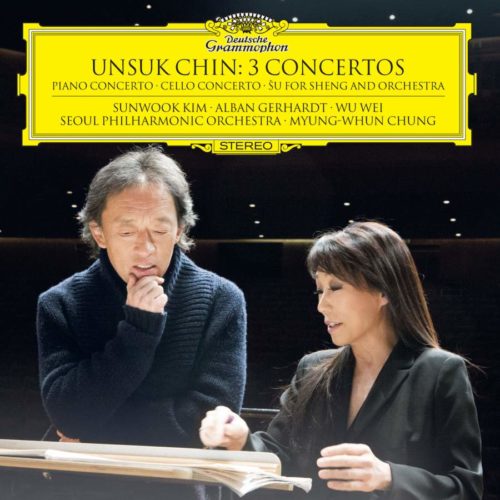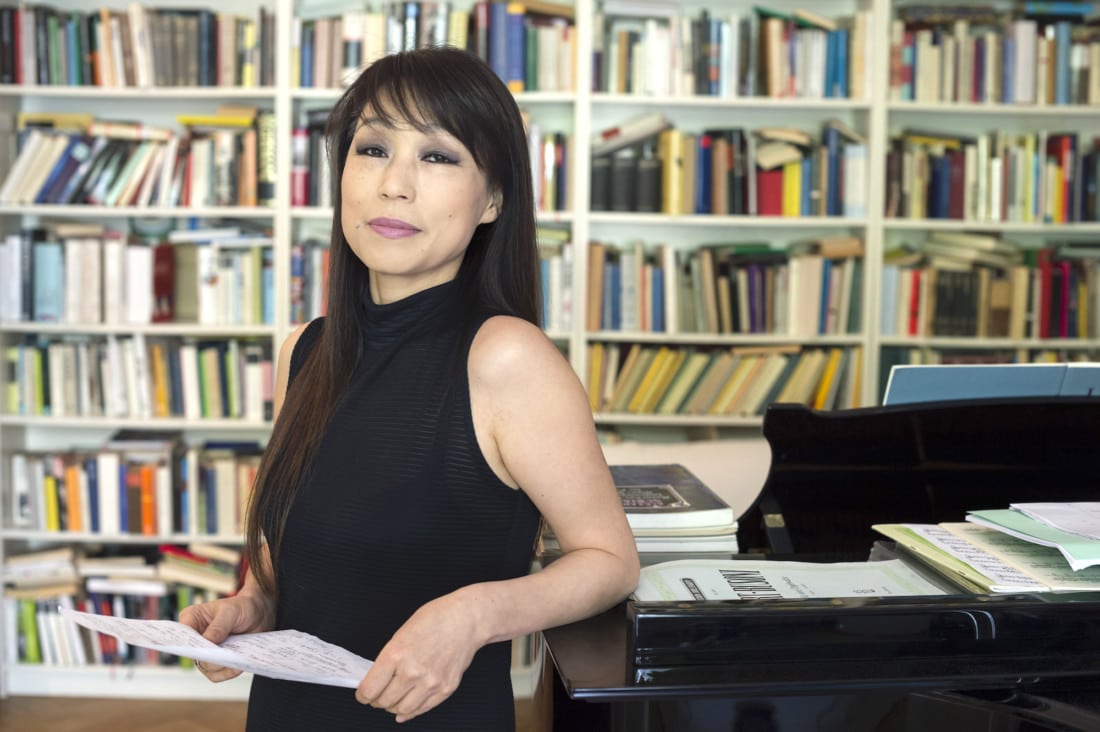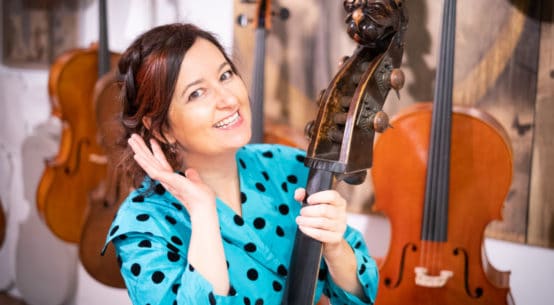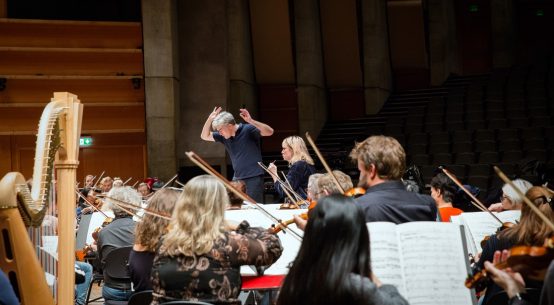– All the colours, images and physical phenomena I experience in dreams give me positive energy and vision for composing, says Unsuk Chin, this year’s Festival Composer and Artist in Residence at the Bergen International Festival.
Norsk versjon / Norwegian version
The Korean composer Unsuk Chin (1961–) studied piano and composition with Sukhi Kang in Seoul, and from 1985 with György Ligeti in Hamburg.
Her first large orchestral piece, Troerinnen (1986) for women’s voices, was premiered by Bergen Philharmonic Orchestra, Bergen Opera Choir and soloists in 1990.
She has lived in Berlin since 1988, and made her breakthrough in 1994 with Akrostichon-Wortspiel (acrostic wordplay) for soprano and ensemble, which is one of her works that will be performed at the 2019 Bergen International Festival.
Leading up to this yearly event in the beautiful city at the Norwegian West Coast, we sent her an email with some questions. Her answers were lengthy and thorough:
– In an interview with The Guardian you said that your music is a reflection of your dreams – and that you want it to communicate joy and warmth. I find that very interesting – is it like your music comes to you in dreams? Can you hear sounds in your dreams?
– I often feel attracted to literature or art that combines logical strictness and crazy imagination.
– My dreams have nothing to do with music directly, but all the colours, images and physical phenomena I experience in dreams give me positive energy and vision for composing. Dreams are for me an encounter with another world, in which completely different physical laws prevail.
– How is your writing process? Do you need solitude and isolation, or is it coming out from engaging in the community/city life?
– I can work under very different circumstances, but what is usually helpful is the pressure of deadlines.
– Is there a message or a subtext in some of your works, or is it a world in itself?
– In principle I see music generally as a world in itself, but at the same time indirectly influenced by anything imaginable.
– In addition to joy and warmth, what do you want to express in your music?
– I don’t know whether I want to express anything special, I just try to write good music. But I have wished to escape from what, in some cases, is a somewhat technocratic and self-contained ideology of post-World War II avantgarde to a music that is open to different impulses and doesn’t shy away from communicating.
– I love that you use texts by Michael Ende and Lewis Carroll, both known for making visits to dreamlike worlds. Do you feel that your music inhabits similar worlds?
– Yes, I often feel attracted to literature or art that combines logical strictness and crazy imagination. With Carroll, for instance, I was fascinated how everyday reality and its physical laws were being transcended by means of absurdities, paradoxes and dreamlike leaps of logic. The fantastical is of great interest for me, and influences in my works have come for instance from Olafur Eliasson’s installations, from Luis Bunuel’s movies, and from modern poetry, cosmology and physics.
– Both the opening and the ending of your opera, based on Alice in Wonderland, is different from Lewis Carroll’s original novel; both scenes aptly named ‘Dream’. It feels kind of autobiographic (arrest me if I’m wrong), where the opening is like an initiation into the world of books and art (and music!), and the ending like it’s saying “this is just the beginning”, like the world is ready to open up for the (young) protagonist?
– Why not, yes. I must admit that I didn’t like how Carroll’s book started and ended, because that felt quite conventional. By introducing the two dreams I could play with structure and the perception of time, and do something that questions linear narration.
– Your first large orchestral piece, Die Troerinnen, was premiered by Bergen Philharmonic Orchestra in 1990. How did that come to be?
– I don’t know whether I want to express anything special, I just try to write good music.
– My work had been chosen to be performed during the ISCM World Music Days, which took place in Oslo that year. It was a very important experience in my professional life as a musician.
– You’ve described the piece Gougalon as an imaginary folk music inspired by your childhood in Seoul, «after the Korean war and before the radical modernization». What do you remember from this time? How was your life back then?
– As for ‘Gougalon – Scenes from a Street Theatre’, I was inspired by members of a group of entertainers I saw a number of times as a child in a suburb of Seoul, a troupe of musicians, mountebanks and travelling hawkers. The quality of the performances raised incredible emotions in the spectators, even though it was incredibly amateurish and kitschy.
– At that time, a decade after the Korean war, South Korea was among the world’s poorest countries, ruled by military dictatorship. The society in general was patriarchal, strictly hierarchical and oppressive. I survived by pursuing the dream of becoming a musician.
– I had a bit of a déjà-vu experience of those times when I saw Michael Haneke’s movie ‘The White Ribbon’, despite all the cultural differences between 1910s Germany and 1960s South Korea. By the way, I am a huge admirer of Haneke’s work, of its perfectionism and the way he points his fingers into the wounds by addressing the traumas, skeletons and lies of a society. That is of universal relevance.
– Your music feels very cosmopolitic, but also contains eastern flavours. Do you find inspiration in Korean folk music?
– When I met the fantastic sheng virtuoso Wu Wei, who had hugely enhanced the capacities of this instrument, I knew that I could finally write something for this instrument.
– I think that creative musical minds have always been inspired by different musical cultures, and have never confined themselves to a single musical identity. If the contrary would have been the case, music would have athrophied a long time ago (by the way, I am against any solitarist notion of human identity, which seems again to be on the rise in our times, where national and cultural chauvinisms have recently become more prominent).
– On the other hand, there exists also commercially-motivated ‘world music’, which mixes all things possible and impossible into a pot, usually without respect and understanding of where different kinds and traditions of music comes from.
– I have studied different traditions of vernacular music, including Korean and other Asian ones, and much of it – for instance Balinese gamelan music – is a great source of inspiration. However, I think it is very difficult, and usually not possible, to instantly mix it with so-called Western classical music.

– Isang Yun did it successfully in some of his works, but that was a long time ago, and he still had first-hand experience of some of the traditional Korean music. The closest encounter between Asian traditional and ‘Western classical’ music is my Concerto for sheng and orchestra.
– The sheng, a Chinese mouth organ, is an instrument that has fascinated me since my childhood, and when I met the fantastic sheng virtuoso Wu Wei, who had hugely enhanced the capacities of this instrument and premiered hundreds of new works, I knew that I could finally write something for this instrument. In that piece, also the orchestral writing was greatly inspired by the sheng.
– I’ve heard that you, at an early age, taught yourself music theory and to play the piano. How did you do that? What did your parents and other tutors contribute with?
– My father was a Presbyterian minister. Although I am an agnostic myself, I have a similar background as most Korean classical musicians who have had a Christian upbringing.
– The first time I encountered the piano was when I was two years old, when my father bought a small piano for his church. Two years later, I started to play the piano, and was immediately absorbed. My father teached me the rudiments of reading music, and when I was seven years old, I started to accompany his church services on a small organ.
– It was hard work, since I had to sight-read the music and adjust on the spot when the churchgoers made mistakes, sang higher, for instance. That was actually my first encounter with ‘Western’ classical music. I also earned money or goods for my family by playing piano on weddings and other occasions. My older sister received singing lessons, so I learned music theory autodidactically by studying her course books. Musical scores were unaffordable, so I copied some of them out in full.
– A middle school music teacher, who was a composer himself, discovered my talent, encouraged me to compose and provided me with scores and recordings. He also gave me the advice to apply to the Seoul National University, the country’s top university.
– However, due to the lack of private tuition, I failed the entrance exams twice. The requirements were very academic and rigid, and I didn’t know that I wasn’t allowed to use a ballpoint pen. When I applied for the third time, I passed the exams and started to study with Sukhi Kang.
– What did you learn from Sukhi Kang? How did you meet him? Was it Kang that directed you to study with Ligeti?
– Sukhi Kang had just returned from Europe to Korea. He was excellent in teaching his students techniques and craftsmanship. But what was equally important was that he was internationally orientated and progressive. He organized the first Korean festivals of Avantgarde music, he had lots of contacts, and introduced us students to recordings and scores of the leading European composers back then.
– That was not self-evident; at that time it was very difficult to obtain any information about international contemporary music (before that, my knowledge of music history extended only to early Stravinsky). He also encouraged me to enroll in international competitions, and when I was awarded twice, it was time to study in Europe.
– I was excited about all the contemporary music he acquainted us with – Ligeti, Xenakis, Boulez, Messiaen, Stockhausen and others – but Ligeti’s music spoke most directly to me, and so I decided to apply to study with him.
– How was it to study under György Ligeti? I’ve heard that he was very strict with his students? What was the most important things you learnt from him?
– Ligeti was very critical about what he felt to be clichés of an academic avant-garde, and reacted allergically if he spotted such signs in the music of his students. It ẃas a hard school.
– The most important thing, perhaps, was openness of mind, obsession on quality and self-criticism. When I studied with him, he had renounced the style of his earlier works, and started to compose in an entirely different style – at age 60. He was very critical about what he felt to be clichés of an academic avant-garde, and reacted allergically if he spotted such signs in the music of his students.
– It was a hard school, and I couldn’t compose a work for almost three years – one of my first works after that break was ‘Akrostichon-Wortspiel’ – but beneficial in the long run.
– You have a special artistic relationship to Myung-Whun Chung. What has he meant for your development as an internationally respected composer?
– The first time I encountered Chung’s name was when I was in my early teens and wished to pursue the career of concert pianist. Back then, Chung was in his early 20’s, and he won a prize at the Tchaikovsky piano competition. When I heard about that, I recognized it was too late for me to become a concert pianist, given my lack of formal training.
– Thirty years later, he appointed me as Composer in Residence of the Seoul Philharmonic Orchestra, where I founded a new music series which I led for twelve years. Chung also recorded and performed my music, and his interpretations are always something very special. He is a great and visionary conductor. Other conductors with whom I have worked closely, and who have been very important for my musical life, include Kent Nagano, Alan Gilbert and Simon Rattle – among many others.
– What’s the hardest thing you’ve ever done as a composer?
– Every new work is a challenge, and it is difficult to foresee how the working process shall be. The challenges can be very different. Writing an electroacoustical piece of music is very different than writing vocal music, and writing an ‘abstract’ instrumental work is different from a piece which has a certain kind of programme (such as the ensemble pieces which will be performed by the BIT20 ensemble).
– When I wrote my Sheng Concerto, it required lots of research in beforehand, as the instrument is a very peculiar one, but the actual process of composition was relatively straightforward. On the other hand, I remember almost becoming depressive when writing one of my Piano Etudes – a three-minute long work whose gestation took many months.
– How is it to be both a female and an Asian composer in the world of classical music, which is (mostly) dominated by European men?
– Being a composer is a strange thing, especially as the concert circuit is very much focused on the tradition, which is why it doesn’t occur to many people that there can still be living composers.
– When I started my career as a composer in the mid-1980s, there existed strong glass ceilings for a female Asian composer, at least in Germany. I chose to ignore them, as if they did not exist, concentrating on doing my work as well as I could and constantly trying to improve its quality – and not thinking about what other people might think, since I wouldn’t have been in a position to change their preconceptions anyway (moreover, pondering prejudices would have been stifling for my compositional work).
– You have lived in Berlin since 1985. Do you find inspiration from living in the cultural capital of Europe?
– I enjoy living in Berlin, it’s been my hometown for 30 years, because you can have so many things: lots of cultural offers, but also privacy. One could even call it a ‘big village’.
– Do you meet and/or collaborate with other Berlin/German composers?
– Not much. Composing is a solitary profession, and there are scarcely possibilities to collaborate. On the other hand, exchanging ideas and experiences with someone like George Benjamin, a friend and a wonderful composer, is of great worth.
– What is the best about being a composer? And the worst?
– I have always only been a composer, so I can’t say what is best or what is worst. In general, being a composer is a strange thing, especially as the concert circuit is very much focused on the tradition, which is why it doesn’t occur to many people that there can still be living composers. Financially and existentially it is very risky pursuing the career of a composer, but nowadays, I am luckily able to make a living from composing.
– Also, it would be great if you could give the Bergen audience some short comments about the each of the six works to be played on Bergen International Festival:
- Gougalon (2010/2011) for ensemble
- Cosmigimmicks (2011/2012) for ensemble
- ParaMetaString (1996) for string quartet and tape
- Double Bind (2007) for violin and electronics
- Akrostichon-Wortspiel (1991, rev. 1993) for soprano and ensemble
- Piano Concerto (1996-1997) for piano and orchestra
– The chosen works give a nice overview of my work from almost three decades.
- ‘Akrostichon’ is my ‘breakthrough work’, whose text was written during the process of composing, and it highlights the different capacities of the voice in a playful manner.
- ‘ParaMetaString’ and ‘Double Bind?’ include electronics; the latter work was realized at the IRCAM in Paris.
- The Piano Concerto was the first of so far seven instrumental concertos. It’s very difficult for both pianist and orchestra, and wasn’t much performed for almost two decades, but has now been ‘rediscovered’, especially thanks to the phenomenal pianist Sunwook Kim, who has recorded it on Deutsche Grammophon.
- And then there are two recent ensemble works – ‘Gougalon’, a work of ‘imaginary, ironic folk music’, reflecting on childhood memories of street theatre, and ‘Cosmigimmicks’, which was inspired by the art of pantomime in its different guises – from East Asian shadow play to the mime Marcel Marceau and the wordless plays Act Without Words I and Act Without Words II by Samuel Beckett.
The 2019 Bergen International Festival takes place at various venues in Bergen (Norway), between May 22 and June 5. More information: fib.no. More information about Unsuk Chin to be found at boosey.com/composer/unsuk+chin
[PostBlock id=348]
Works by Unsuk Chin that will be performed at the 2019 Bergen International Festival:
Akrostichon-Wortspiel (1991, rev. 1993) for soprano and ensemble: Bergen Cathedral, June 4. Performed by Sara Hershkowitz (soprano) and Arctic Philharmonic Sinfonietta, directed by Tim Weiss.
ParaMetaString (1996) for string quartet and electronics: Troldsalen at Troldhaugen (the home of Edvard Grieg), June 3. Performed by Oslo String Quartet.
Double Bind (2007) for violin and electronics: Bergen Cathedral, June 4. Performed by Peter Herresthal (violin) and Arctic Philharmonic Sinfonietta, directed by Tim Weiss.
Piano Concerto (1996-1997): Griegsalen (Grieghallen), June 5. Performed by Sunwook Kim (piano) and Bergen filharmoniske orkester, directed by Edward Gardner.
Gougalon (2010/2011) for ensemble: Peer Gynt-salen (Grieghallen), May 31. Performed by Carte Blanche (The Norwegian National Company of Contemporary Dance) and BIT20 Ensemble, directed by Pierre-André Valade.
Cosmigimmicks (2011/2012) for ensemble: Peer Gynt-salen (Grieghallen), May 31. Performed by Carte Blanche (The Norwegian National Company of Contemporary Dance) and BIT20 Ensemble, directed by Pierre-André Valade.





